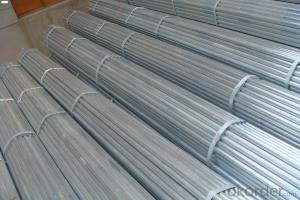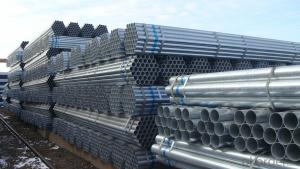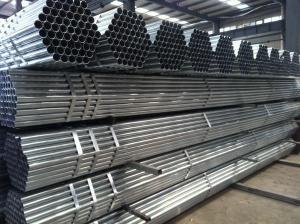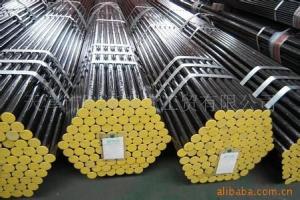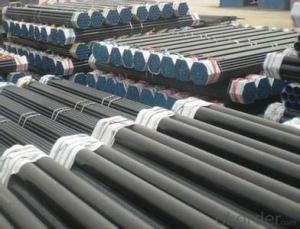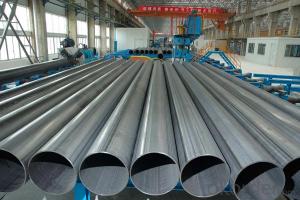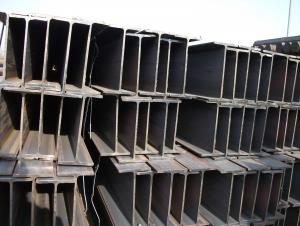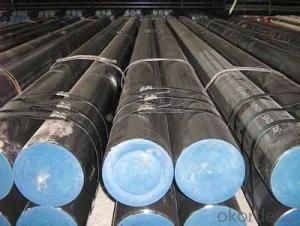Steel Pipe with High Quality and Best Price Q345
- Loading Port:
- Tianjin
- Payment Terms:
- TT or LC
- Min Order Qty:
- 25 m.t.
- Supply Capability:
- 50000 m.t./month
OKorder Service Pledge
OKorder Financial Service
You Might Also Like
1. Structure of Steel Pipe Q345 Descrption:
Having vast industrial knowledge of domain, we are offering a quality approved array of Stainless Steel Round Pipe. The Stainless Steel Round Pipe we offer is widely demanded amongst the clients for its sturdiness and reliability. These products are tested for their quality before being introduced in the market.
2. Main Features of the Steel Pipe Q345:
·Highly demanded
·Durable
·Reliable
·resist corrosion
·reasonable price
3. Steel Pipe Q345 Images:
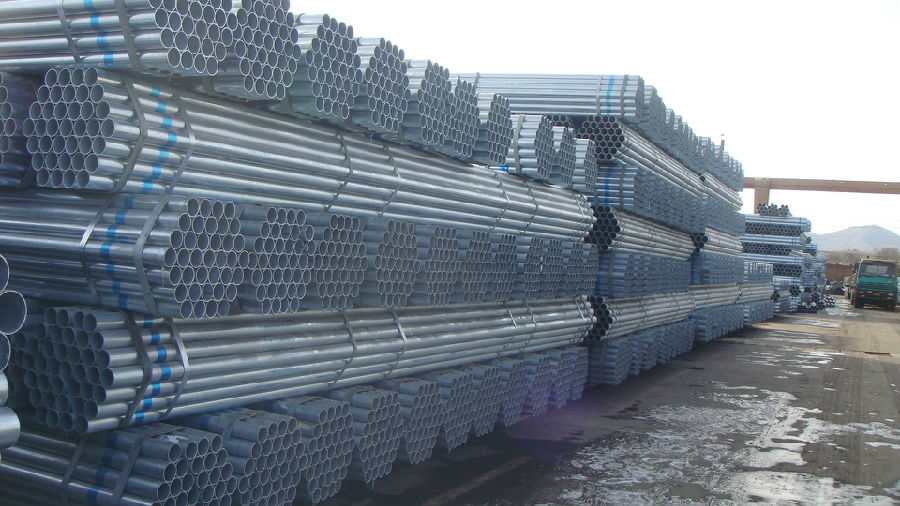
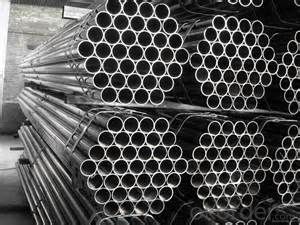
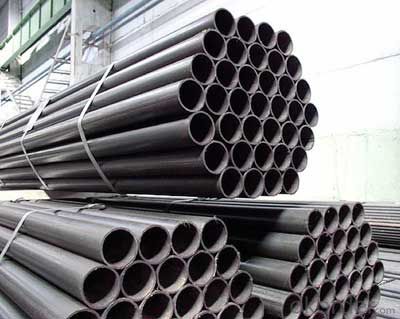
4. The Steel Pipe Q345 Specification:
Standard
JIS, DIN, ASTM
JIS G3445-2006, JIS G3444-2006, JIS G3446-2004, DIN EN 10216-1-2004, DIN EN 10217-1-2005, DIN EN 10305, ASTM A106-2006, ASTM A53-2007, ASTM A789-2001, ASTM A1020-2002, ASTM A179-1990, ASTM A199Grade
Cr-Mo alloy, Mo, ST35-ST52, Q195-Q345, CrNi alloy
15CrMo, 10CrMo910, 30CrMo, 15Mo3, 16Mo, St37, St52, St42, St45, Q235, Q345, Q195, Q215, Cr17Ni8, 1Cr13Mn9Ni1NThickness
2 - 50 mm
Section Shape
Round
Outer Diameter
10 - 900 mm
Secondary Or Not
Non-secondary
Application
Structure Pipe
Technique
EFW
Certification
API
Surface Treatment
Paint
Special Pipe
API Pipe
Alloy Or Not
Non-alloy
Specifications
1.W.T from 2mm to 70mm
2.OD from 10 to 1200mm
3.product by our own factory
4.on time dilivery
- Q: Can steel pipes be used for transporting liquids?
- Yes, steel pipes can be used for transporting liquids. Steel pipes offer excellent strength, durability, and resistance to corrosion, making them suitable for various applications, including the transportation of liquids such as water, oil, and gas.
- Q: How are steel pipes used in the manufacturing of automotive exhaust systems?
- Steel pipes are commonly used in the manufacturing of automotive exhaust systems due to their durability, heat resistance, and ability to withstand corrosive gases. These pipes are utilized to transport and direct the exhaust gases from the engine to the rear of the vehicle. They are often bent and welded to create a complex system of pipes, mufflers, and catalytic converters, ensuring the efficient flow and treatment of exhaust gases while reducing noise levels.
- Q: How are steel pipes used in the agriculture sector?
- Steel pipes are commonly used in the agriculture sector for various purposes, such as irrigation systems, drainage systems, and structural support for farm buildings and infrastructure. They are also used for conveying water, chemicals, and other fluids, as well as for constructing fencing and livestock enclosures. Moreover, steel pipes are utilized in the construction of machinery and equipment essential for farming operations.
- Q: What are the different manufacturing standards for steel pipes?
- There are several manufacturing standards for steel pipes that are widely recognized and implemented in the industry. These standards ensure that the steel pipes are produced to meet specific requirements and quality standards. Some of the most common manufacturing standards for steel pipes include: 1. American Society for Testing and Materials (ASTM): ASTM standards are widely used in the United States and cover a wide range of steel pipe specifications. These standards include specifications for seamless and welded steel pipes, as well as various grades and dimensions. 2. International Organization for Standardization (ISO): ISO standards are globally recognized and provide guidelines for the production of steel pipes. ISO standards cover areas such as dimensions, materials, testing, and quality control. 3. European Norm (EN): EN standards are applicable in Europe and provide specifications for various types of steel pipes. These standards cover aspects such as dimensions, materials, manufacturing processes, and testing. 4. Japanese Industrial Standards (JIS): JIS standards are widely used in Japan and have gained international recognition. These standards cover dimensions, materials, and testing methods for steel pipes. 5. British Standards (BS): BS standards are commonly used in the United Kingdom and cover a range of steel pipe specifications. These standards include requirements for dimensions, materials, and testing procedures. 6. American Petroleum Institute (API): API standards are specifically developed for the oil and gas industry and cover various aspects of steel pipe manufacturing. These standards include specifications for seamless and welded pipes used in oil and gas exploration, production, and transportation. It is important for manufacturers, buyers, and users of steel pipes to be aware of these standards to ensure the quality, compatibility, and reliability of the pipes. Compliance with these standards helps to ensure that the steel pipes meet the necessary requirements and are suitable for their intended applications.
- Q: Can steel pipes withstand high temperatures?
- Yes, steel pipes can withstand high temperatures. Steel is known for its excellent thermal conductivity and high melting point, making it suitable for various applications that involve exposure to elevated temperatures.
- Q: How are steel pipes used in the manufacturing of structural frameworks?
- Steel pipes are commonly used in the manufacturing of structural frameworks due to their strength and durability. They are used as structural members to support the weight of buildings, bridges, and other infrastructure. Steel pipes are often used as columns, beams, and braces to provide stability and load-bearing capacity to the structures. The pipes are typically welded or bolted together to create a rigid framework that can withstand heavy loads and structural forces.
- Q: Can steel pipes be recycled after their useful life?
- Steel pipes can indeed be recycled once they have served their purpose. Steel, being an incredibly recyclable substance, can be recycled even in the form of pipes. The recycling of steel pipes entails the collection of used pipes, followed by thorough cleaning to eliminate any impurities, and finally transforming them into fresh steel products. This recycling process contributes to the preservation of natural resources, curbs energy usage, and limits waste generation. Moreover, recycling steel pipes aids in mitigating the environmental repercussions linked to the manufacturing of new steel.
- Q: How are steel pipes used in the construction of coal-fired power plants?
- Steel pipes are commonly used in the construction of coal-fired power plants for various purposes. They are utilized for transporting coal and other fuels, as well as for carrying water and steam in the power generation process. Steel pipes are also used in the construction of the plant's cooling system, helping to circulate water and dissipate heat. Additionally, they are employed in the construction of the plant's exhaust system, facilitating the removal of combustion byproducts. In summary, steel pipes play a crucial role in the infrastructure of coal-fired power plants, enabling efficient fuel transportation, heat exchange, and waste management.
- Q: What is the difference between steel pipes and cast iron soil pipes?
- The main difference between steel pipes and cast iron soil pipes lies in their composition and durability. Steel pipes are primarily made of steel, a strong and versatile material known for its high tensile strength. On the other hand, cast iron soil pipes are made of cast iron, a material known for its excellent corrosion resistance and sound-dampening properties. While steel pipes are more rigid and suitable for carrying pressurized fluids, cast iron soil pipes are designed specifically for wastewater and sewage systems due to their superior resistance to rust and noise reduction qualities.
- Q: What is the difference between steel pipe and polyethylene pipe?
- The main difference between steel pipe and polyethylene pipe lies in their materials and properties. Steel pipe is made from a durable and strong material, which makes it suitable for high-pressure applications and environments where strength is crucial. On the other hand, polyethylene pipe is made from a plastic material that offers flexibility and resistance to corrosion, making it ideal for underground and aboveground installations. Additionally, steel pipe requires welding or threading for connections, while polyethylene pipe uses fusion or mechanical fittings. Ultimately, the choice between steel pipe and polyethylene pipe depends on the specific requirements of the project and the desired characteristics needed.
Send your message to us
Steel Pipe with High Quality and Best Price Q345
- Loading Port:
- Tianjin
- Payment Terms:
- TT or LC
- Min Order Qty:
- 25 m.t.
- Supply Capability:
- 50000 m.t./month
OKorder Service Pledge
OKorder Financial Service
Similar products
Hot products
Hot Searches
Related keywords
